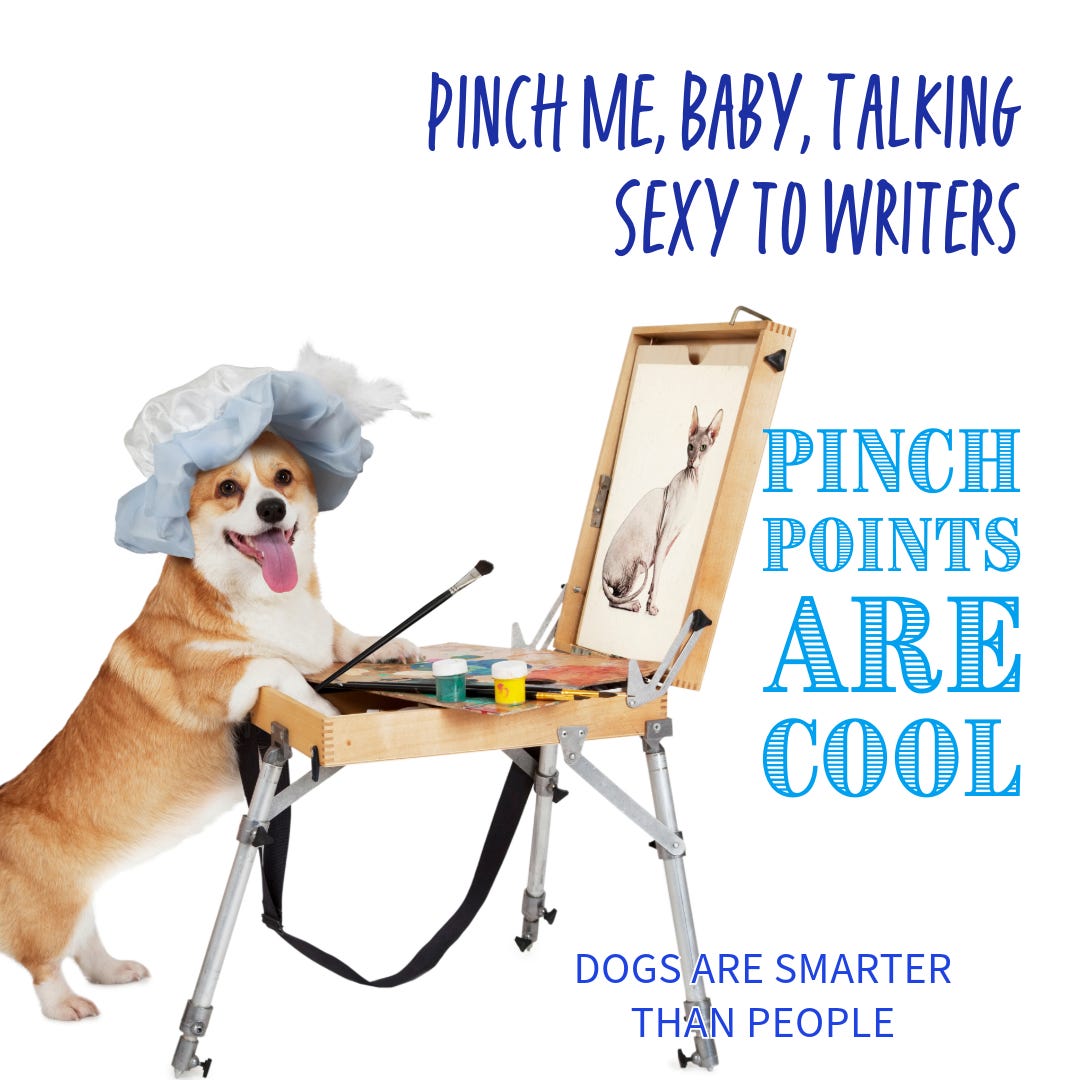
There are some things in the writing world that don’t make a ton of sense in the world of regular humans.
One of those things is pinch points.
This podcast episode is going to be the start of a quick series of podcasts and regular posts about pinch points. The regular posts will be at our Substack LIVING HAPPY under the WRITE BETTER NOW publication.
So, what are these little twerps called pinch points?
They a way of thinking about novel or story structure that helps us keep the reader engaged.
Pinch points are moments where the tension emerges again or is heightened. It’s a place where you seductively say to the reader, “Hey, baby. Let’s engage again.” Or maybe it’s that they are saying, “Dear Reader, let me remind you what exactly is at stake here for our poor, dear, pathetic hero.”
The pinch points are where the protagonist or hero of your story gets a little bit of pain. Ouch. So mean, us writers are so very mean.
As Writing Mastery describes, “They rekindle the tension that may have waned by reminding us of the primary conflict and what it means for the characters. Without stakes, readers will quickly lose interest— therefore, pinch points are events of the plot that, strategically placed, keep the narrative from losing steam.”
“In the traditional Three-Act Structure, the first act introduces the characters, setting, and conflict, while the third act culminates in the resolution. The second act, which constitutes the middle portion of the story, is often the longest and contains the rising action. Pinch points punctuate this act to create a sense of urgency and drive the story forward.”
Pinch Points Are Not Plot Points
So, here’s the super important thing. Pinch points are not plot points. Yes, there is a lot of P-words in there, but to pinch is not to plot, though a dastardly villain might plot how to pinch.
Plot points
move the story forward
are an event
connect the events of your story so it’s not episodic.
Pinch points
Raise stakes or increase the conflict.
Obstruct the hero from getting her goal, so often focus on the bad guy of the story or the antagonist and this is a big part of it, this is what makes it not a turning point
Make the reader curious about what might happen, make them worried about what might happen, so keeps them reading
Show us what our heroes are made of because of the extra pressure that these challenges create.
As Writers Helping Writers writes, “New writers often concentrate on the Hook, Midpoint, and the big twist at the end. But without well-placed Pinch Points, the story will lose its sense of rising action, conflict, and tension. The quest cannot exist without an opponent, and the Pinch Points show the reader what that opposition is all about.
“Pinch Points show how high the stakes are. They also set up the emotional change within the hero as they react to the new situation.”
So, tomorrow on the blog, I’ll be talking about where these babies go in your story.
DOG TIP FOR LIFE
Do not let the pinch points keep you from moving forward toward yo
COOL EXERCISE
Think about the bad guy in your story. Now write down:
Their fetish
What they’d buy at the grocery store
What they’d buy at Wal-Mart
What they could do to make things harder on the hero and easier on themselves
PLACE TO SUBMIT
River Styx
The Castro Prize, named for our founding editor, Michael Castro, is a new prize awarded annually to exemplary works of poetry and fiction. River Styx editors carefully read and discuss contest entries and ultimately submit the strongest ten entries to the judges. For our 2024 contest, Christopher Castellani will judge fiction and Dg Okpik will judge poetry. We will award one winner for fiction and one for poetry, with one runner-up in each genre. The first-place prizes are $1000 each, plus publication in print and online.
The entry fee is $20. If you would like to receive a copy of our latest print issue, River Styx 107, you may do so at a discounted rate of 50% off ($9.95). (Shipping rates apply. The discount is good for one copy of RS107 per entrant and cannot be combined with any other discounts or offers.) Entrants will receive a discount code in their confirmation email.
Works of fiction should not exceed 5000 words. You may send up to three poems. Work must be previously unpublished. You may submit multiple entries but each work must be submitted separately. If the work is a simultaneous submission, we ask that you notify us immediately upon publication elsewhere and withdraw the piece via Submittable. Withdrawing a submission will not result in a refund of the entry fee. The contest runs from May 1, 2024 through September 30, 2024. The winners will be announced on January 1, 2025.
All contest entries are read blind. The winner is chosen based on the strength and inventiveness of the writing, not on academic background, publication history, or any other accolades. Please do not include your name or any other identifying information on the work itself. Submittable provides features that allow us to read the work without seeing the contributor's name, contact information, or cover letter. Once winners are chosen, we can "unhide" this information to identify the winners.
SHOUT OUT!
The music we’ve clipped and shortened in this podcast is awesome and is made available through the Creative Commons License.
Here’s a link to that and the artist’s website. Who is this artist and what is this song? It’s “Summer Spliff” by Broke For Free.




